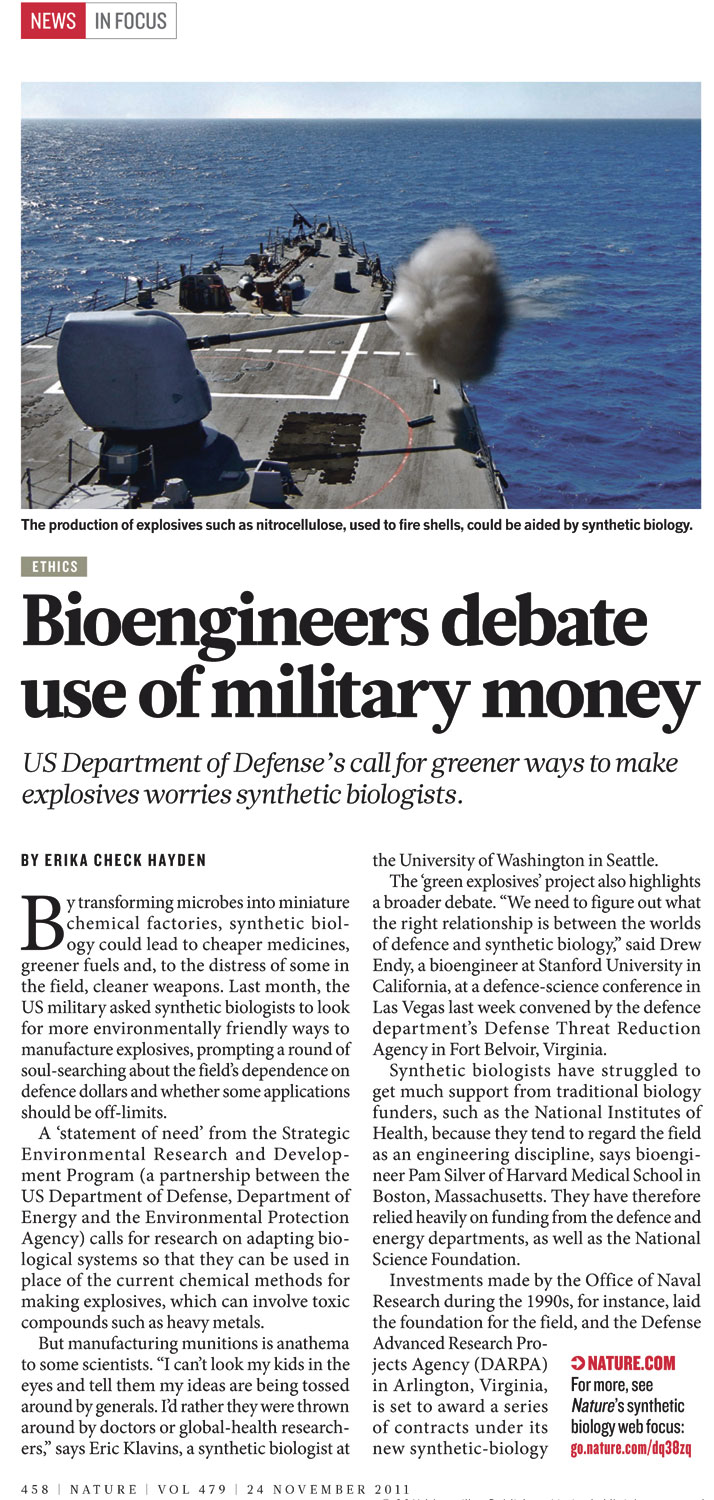If you’re working on biofuels, funded by the army, would you hesitate if they asked you to help develop green explosives? Nature reports on the recent worries of some US synthetic biologists.
It all began last month following a ‘statement of need’ from the Strategic Environment Research and Development Program, asking for help from microbiologists to adapt microbes to the biological production of explosives instead of biofuels or bioplastics, which they were working on previously.
The dilemma starts with the large research funding by the US Department of Defence. “They have a very large budget, which allows them to finance and orchestrate many research topics,” explains Dr Behnam Taebi, a philosopher at TPM, who points out that many research projects are not military in character but just facilitate operations. Think of solar cells, biofuels or robotic research.
Professor Jack Pronk, a microbiologist at the faculty of Applied Sciences, also works on biofuels. His current research is not funded by the (Dutch) Ministry of Defence, yet Prof. Pronk has no principal objections to military funding.
He can nevertheless imagine that his US colleagues think twice about working on green explosives. After all, knowing what your work will eventually be used for is part of one’s job satisfaction. Nature even quotes a US biologist who says he couldn’t face his children if forced to confess he is developing explosives.
Prof. Pronk however argues that industrial microbiology has long ago lost its innocence. During the First World War, German researchers added sulfite to an alcohol fermentation process, thus steering the yeast towards the production of glycerol, with the sole purpose of turning it into the highly explosive nitroglycerine. Ethical decisions in science strongly depend on historical circumstances, the professor contends: “Just read the biography of Robert Oppenheimer, the father of the atomic bomb.”
Taebi wants to broaden the perspective of the discussion. What is really at stake, he says, is whether or not the war (or the one that one prepares for) is a ‘Just War’. This concept was introduced by Hugo de Groot (Delft, 1583) in his groundbreaking ruminations on International Law. According to De Groot, a war is ‘justified’ in a nation’s self-defence or in an attempt to prevent gross injustice, like genocide. Thus, a UN resolution makes a war legal, but not necessarily just, says Taebi. The latest wars in Afghanistan and Iraq were neither legal nor just.
If however the war is just, one should also discuss the responsible manufacturing and use of weapons. Questions seemingly become legitimate when it is a question of whether depleted uranium should be used in vehicles (minimising risk to the military personnel), whether cluster bombs are permissible weapons (minimising the risk for future inhabitants in a war zone), and whether we should minimise environmental damage by producing explosives more ecologically. Harm should always be minimised.
Prof. Pronk says that irrespective of the government’s or university’s standpoint, academic researchers should retain the right to refuse weapons research if it goes against their conscience. Taebi agrees, but he would like researchers to be more vocal in public discussions about their ethical dilemmas: “The concept of a just war is not only a moral discussion for philosophers; it’s also of political and practical importance to engineers and researchers.” Taebi would therefore welcome an open discussion at the university about military funding.
Nature, Vol. 479, 24 November 2011, p. 458
Lucas stelde dit najaar voor om studenten door het bedrijfsleven te laten sponsoren met scholarships. Inmiddels heeft ze enkele gesprekken met werkgevers achter de rug.
Wat is uw eerste indruk?
“Ik verwacht dat er genoeg bedrijven en organisaties zijn die studenten al voor hun afstuderen aan zich willen binden. Zo’n scholarship is duur, maar daar staat tegenover dat werkgevers minder geld hoeven uit te geven aan werving. Een bijkomend voordeel is dat ze opleidingen kunnen laten weten welke vaardigheden ze missen bij hun afgestudeerden.”
“Scholarships zijn denk ik vooral aantrekkelijk voor bedrijven die lager scoren op de favorietenlijstjes van studenten of die moeite hebben met het vinden van gespecialiseerd personeel. Daarom zal dit plan eerder lukken bij specialistische masteropleidingen, dan bij een algemene opleiding als communicatie. Met de beurzen geven bedrijven studenten een duwtje in de richting van masters die ze anders misschien niet zouden kiezen.”
Zijn er al bedrijven of instellingen geïnteresseerd?
“Bij de tweejarige masteropleiding notarieel recht van de Universiteit Utrecht, bieden verschillende grote notariskantoren stageplaatsen aan en verzorgen ze lessen. Elk kantoor betaalt bovendien twaalfduizend euro per jaar, zodat studenten alleen voor het eerste jaar collegegeld verschuldigd zijn.”
Maar zulke vormen van werving zijn niet voor alle bedrijven en opleidingen interessant. “Ik heb gisteren met Philips gepraat en dat doet niet mee, hoewel het de scholarships een goed idee vindt. Het bedrijf is heeft eigen zeggen genoeg keuze op de arbeidsmarkt. Overigens haalt Philips veel kenniswerkers uit China. Dat vind ik zorgelijk, maar zo gaat dat in die wereld.”
En nu?
“Ik ga binnenkort een bijeenkomst organiseren met de personeelsfunctionarissen van grote bedrijven om te bespreken hoe we ze meer bij opleidingen kunnen betrekken en eerder in contact kunnen brengen met studenten. Ik wil weten welke vaardigheden zij missen bij afgestudeerden en op welke gebieden scholarships interessant kunnen zijn.”



Comments are closed.